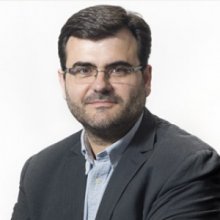Images
Participants


Contact

IRB Barcelona has been awarded two ERC PoC grants to optimise and validate tools with potential clinical applications.
Angel R. Nebreda’s project seeks to develop treatments to reduce the cardiotoxicity caused by chemotherapy.
Eduard Batlle’s project will build a biobank of mouse tumour organoids with the aim to contribute to the treatment of patients with advanced colon cancer.
Eduard Batlle and Angel R. Nebreda, ICREA researchers at the Institute for Research in Biomedicine (IRB Barcelona), have been awarded an ERC Proof of Concept grant. Over the next 18 months and supported by 150,000 euros of funding each, they will devote their efforts to developing tools with potential therapeutic applications in the field of oncology. This is the second time that these scientists have received an ERC Proof of Concept grant.
The Proof of Concept grants awarded by the European Research Council (ERC) seek to support those projects previously funded by this organisation and place special emphasis on those ideas that may improve social wellbeing.
Contributing to the treatment of patients with advanced colon cancer
Colon cancer is one of the main causes of death by cancer, which is greatly associated with metastasis. Based on a biobank of tumour organoids derived from animals with certain gene alterations, the Colorectal Cancer Lab, headed by Eduard Batlle, developed the first genetic model of advanced colon cancer in immunocompetent mice.
This breakthrough is important because, until then, research had been conducted on immunocompromised mice, thereby preventing study of the interaction between the immune system and the tumour.
However, although the biobank is a valuable tool for basic and clinical research, it has a number of limitations with respect to translational research. In this regard, the objective of the project is to build an improved and more complete biobank of tumour organoids that reproduces the preclinical model of advanced colon cancer, widens the collection of models to subgroups of this type of cancer by means of gene editing techniques, and allows the possibility to operate.
“Tumour biobanks will provide unique tools with enormous innovative potential to contribute to the development of new drugs for the treatment of patients with advanced colon cancer,” says Batlle, who is also a member of the CIBERONC network (Biomedical Research Networking Centre in Oncology).
Tackling the cardiotoxicity caused by chemotherapy
The project led by Angel R. Nebreda, head of the Signalling and Cell Cycle Lab, aims to develop therapeutic tools with the capacity to reduce cardiotoxicity and damage to heart muscle.
Chemotherapy-induced cardiotoxicity can cause conditions ranging from arrhythmia to heart failure.
To tackle this heart dysfunction, cardio-oncologists generally make adjustments to the treatment by administering reduced doses over a longer period. However, this makes cancer treatments less efficient and consequently contributes to decreasing patients’ quality of life.
“Our project proposes to develop a drug that can reduce the cardiotoxicity caused by chemotherapeutic treatments without affecting their capacity to kill tumour cells,” explains Nebreda.
The ERC new grants were awarded to researchers working in 16 countries: Austria (2 grants), Belgium (4), Croatia (1), Denmark (1), Finland (2), France (6), Germany (2), Ireland (1), Israel (3), Italy (5), Netherlands (2), Portugal (3), Slovakia (1), Spain (7), Switzerland (3) and the UK (7).
More information: ERC
About IRB Barcelona
The Institute for Research in Biomedicine (IRB Barcelona) pursues a society free of disease. To this end, it conducts multidisciplinary research of excellence to cure cancer and other diseases linked to ageing. It establishes technology transfer agreements with the pharmaceutical industry and major hospitals to bring research results closer to society, and organises a range of science outreach activities to engage the public in an open dialogue. IRB Barcelona is an international centre that hosts 400 researchers and more than 30 nationalities. Recognised as a Severo Ochoa Centre of Excellence since 2011, IRB Barcelona is a CERCA centre and member of the Barcelona Institute of Science and Technology (BIST).





